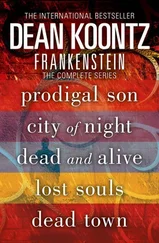From his motel room, he telephoned Hanna Rey in Bright Beach. She still looked after his house on a part-time basis, paid the bills from a special account while he traveled, and kept him informed about events in his hometown. From Hanna, he learned that Barty Lampion's eyes had been lost to cancer.
Paul recalled the letter he had written to Reverend Harrison White a couple weeks after the death of Joey Lampion. He'd carried it home from the pharmacy on the day that Perri died, to ask for her opinion of it. The letter had never been mailed.
The opening paragraph still lingered in his memory, because he had crafted it with great care: Greetings on this momentous day. I'm writing to you about an exceptional woman, Agnes Lampion, whose life you have touched without knowing, and whose story may interest you.
His thought had been that Reverend White might find in Agnes, Bright Beach's beloved Pie Lady, a subject who would inspire a sequel to the sermon that had so deeply affected Paul-who was neither a Baptist nor a regular churchgoer-when he had heard it on the radio more than three years ago.
Now, however, he was thinking not about what Agnes's story might mean to Reverend White, but about what the minister might be able to do to provide at least a small degree of comfort to Agnes, who spent her life comforting others.
After supper in a roadside diner, Paul returned to his room and studied a tattered map of the western United States, the latest of several he'd worn out over the years. Depending on the weather and the steepness of the terrain, he might be able to reach Spruce Hills, Oregon, in ten days.
For the first time since walking to La Jolla to meet Jonas Salk, Paul planned a journey with a specific purpose.
Many nights, his sleep wasn't half as restful as he would have wished, for he often dreamed of walking in a wasteland. Sometimes, desert salt flats stretched in all directions, with here and there a monument of weather-gnarled rock, all baking under a merciless sun. Sometimes, the salt was snow, and the monuments of rock were ridges of ice, revealed in the hard glare of a cold sun. Regardless of the landscape, he walked slowly, though he had the desire and the energy to proceed faster. His frustration built until it was so intolerable that he woke, kicking in the tangled sheets, restless and edgy.
This night in Weott, with the high solemn silence of the redwood forests out there now and waiting to embrace him in the morning, he slept without dreams.
AFTER THE ENCOUNTER with the quarter-spitting vending machines, Junior wanted to kill another Bartholomew, any Bartholomew, even if he had to drive to some far suburb like Terra Linda to do it, even if he had to drive farther and stay overnight in a Holiday ay Inn an eat steam-table food off a buffet crawling with other diners' cold germs and garnished with their loose hairs.
He would have done it, too, and risked establishing a pattern that police might notice; but the still, small voice of Zedd guided him now, as so often before, and counseled calm, counseled focus.
Instead of immediately killing anyone, Junior returned to his apartment on the afternoon of December 29, and went to bed, fully clothed. To calm down. To think about focus.
Focus, Caesar Zedd teaches, is the sole quality that separates millionaires from the flea-ridden, sore-pocked, urine-soaked winos who five in cardboard boxes and discuss vintages of Ripple with their pet rats. Millionaires have it, winos don't. Likewise, nothing but the ability to focus separates an Olympic athlete from a cripple who lost his legs in a car wreck. The athlete has focus, and the cripple doesn't. After all, Zedd notes, if the cripple had it, he would have been a better driver, an Olympic athlete, and a millionaire.
Among Junior's many gifts, his ability to focus might have been the most important. Bob Chicane, his former instructor in matters meditative, had called him intense and even obsessive, following the painful incident involving meditation without seed, but intensity and obsession were false charges. Junior was simply focused He was focused enough, in fact, to find Bob Chicane, kill the insulting bastard and get away with it.
Hard experience had taught him, however, that killing someone he knew, while occasionally necessary, didn't release stress. Or if it did briefly release stress, then unforeseen consequences always contributed to even worse future stress.
On the other hand, killing a stranger like Bartholomew Prosser relieved stress better than sex did. Senseless murder was as relaxing to him as meditation without seed, and probably less dangerous.
He could have killed someone named Henry or Larry, without risk of creating a Bartholomew pattern that would prickle like a pungent scent in the hound-dog nostrils of Bay Area homicide detectives. But he restrained himself.
Focus.
Now he had to focus on being ready for the evening of January 12: the reception for Celestina White's art show. She had adopted her sister's baby. Little Bartholomew was in her care; and soon, the kid would be within Junior's reach.
If killing the wrong Bartholomew had broken a dam in Junior and released a lake of tension, whacking the right Bartholomew would set loose an ocean of pent-up stress, and he would feel free as he'd not felt since the fire tower. Freer than he'd been in his entire life.
When he killed the Bartholomew, this haunting would finally end, too. In Junior's mind, Vanadium and Bartholomew were inextricably linked, because it was the maniac cop who first heard Junior calling out Bartholomew in his sleep. Did that make sense? Well, it made more sense at some times than at others, but it always made a lot more sense than anything else. To be rid of the dead-but-persistent detective, he must eliminate Bartholomew.
Then it would stop. The torment would stop. Surely. His sense of drift, of sliding aimlessly through the days, would lift from him, and he would find purpose once more in determined self-improvement. He would definitely learn French and German. He would take cooking classes and become a culinary master. Karate, too.
Somehow, Vanadium's malevolent spirit was also to blame for Junior's failure to find a new heart mate, in spite of all the women he'd been through. Undoubtedly, when Bartholomew was dead and Vanadium vanquished with him, romance and true love would bloom.
Lying on his side in bed, clothed and shod, knees drawn up, arms folded across his chest, hands pressed under his chin, like a precocious fetus dressed and waiting for birth, Junior tried to recall the chain of logic that had led to this long and difficult pursuit of Bartholomew. That chain led three years into the past, however, which to Junior was an eternity, and not all the links were still in place.
No matter. He was a future-focused, focused man. The past is for losers. No, wait, humility is for losers. “The past is the teat that feeds those too weak to face the future.” Yes, that was the line from Zedd that Junior had stitched on a needlepoint pillow.
Focus. Prepare to kill Bartholomew and anyone who tries to protect Bartholomew on January 12. Prepare for all contingencies.
Junior attended a New Year's Eve party with a nuclear-holocaust theme. Festivities were held in a mansion usually hung with cutting-edge art, but all the paintings had been replaced with poster-size blowups of photos of ruined Nagasaki and Hiroshima.
An outrageously sexy redhead hit on him as he selected from an array of bomb-shaped canapes on a tray held by a waiter dressed as a ragged and soot-smeared blast survivor. Myrtle, the redhead, preferred to be called Scamp, which Junior entirely understood. She wore a DayGlo green miniskirt, a spray-on white sweater, and a green beret.
Читать дальше











